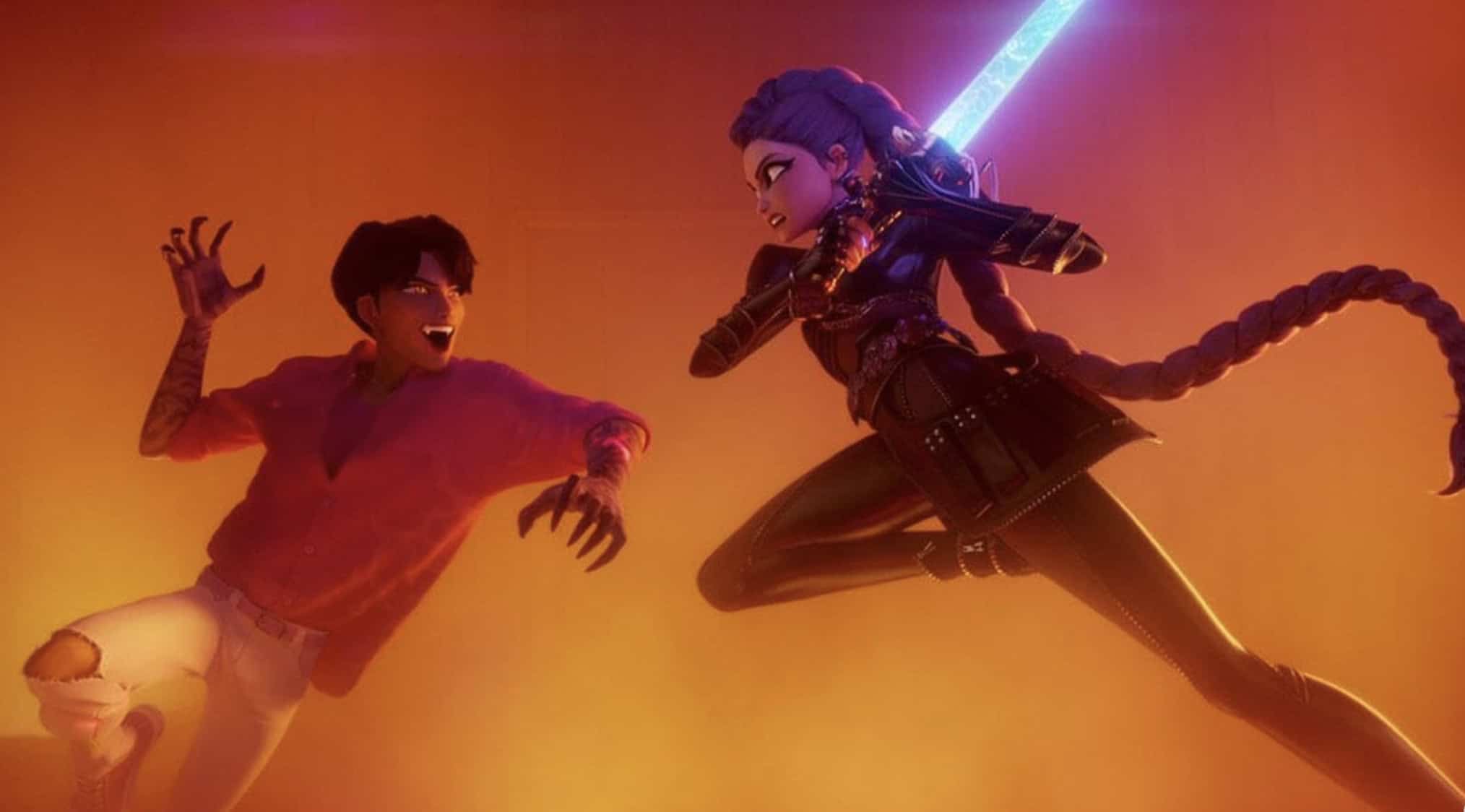*Spoiler Warning for Kpop Demon Hunters*
Between imposter and this monster, I been lost inside my head
Ain’t no choice when all these voices keep me pointing towards no end
It’s just easy when I’m with you, no one sees me the way you do
I don’t trust it, but I want to, I keep coming back to…
Why does it feel right every time I let you in?
These lines from KPop Demon Hunters’ duet “Free” are not just emotionally raw, they reflect the spiritual terrain of the film, one originally mapped by St. Ignatius of Loyola. They speak to the interior conflict between false voices and the quiet pull of the good spirit toward something more whole. In Ignatian terms, this is the movement between desolation and consolation.
On the surface, the 2025 animated musical feels like a high-energy mix of K-pop and fantasy action. Yet beneath its vivid visuals and catchy songs lies a subtle spiritual drama about interior struggle and the voices that shape us. The story follows Rumi, a singer who hides her half-demon identity out of fear that it will estrange her from those she cares about. Chief among those people are her bandmates, Mira and Zoey, who form the Kpop trio known as Huntr/x . Huntr/x is more than just an idol group, however. Together, Rumi, Mira, and Zoey have a larger mission to hunt demons and keep them from the human world by creating a magic barrier known as the Honmoon.
The film never clearly defines what its “demons” are. They might just be malevolent spirits, beings from another dimension, or fantastical echoes of Korean folklore like dokkaebi, the mischievous goblins known for causing trouble and occasionally helping out. What’s certain is that these “demons” are not Christian demons. There’s no hellfire or damnation. Rumi’s half-demon identity is less satanic than symbolic: it embodies the parts of herself she’s afraid to let others see. Ironically, this makes her the perfect vessel for exploring Ignatius of Loyola’s discernment of spirits. Only in a K-pop fantasy can a literal half-demon become the clearest model of someone wrestling with spiritual angst.
St. Ignatius of Loyola, in the Spiritual Exercises, describes consolation as a movement toward our deepest purpose: to love and serve God. It brings joy, energy, and a sense of inner freedom. Desolation moves us in the opposite direction, leading to sadness, restlessness, and a loss of that freedom.
Rumi’s loss of voice is more than physical fatigue. It reflects shame and self-rejection. As part “demon,” she fears that revealing her full self will cost her love and belonging. This fear opens her to one of the enemy’s main tactics, as Ignatius describes: planting half-truths and subtle lies that create doubt and division within the soul. As her demon side gains control, Rumi becomes more isolated from those she loves and from the mission she is meant to carry out.
The demon king Gwi-Ma, the film’s antagonist, exploits Rumi’s fear to isolate her and her teammates through subtle lies that erode their sense of worth. As his schemes continue to fail, Gwi-Ma turns to Jinu, a demon who proposes forming the Saja Boys, a K-pop group. Saja Boys will drain their fans’ energy through their performances and weaken the Honmoon. In return, Jinu asks to forget his human past. At one point, the Saja boys sing “Your Idol,” a song that shows how good desires can be twisted into captivity, offering control instead of love and obsession instead of freedom. This is a false consolation that turns the heart away from its true purpose. Huntr/x uncovers Jinu’s scheme but cannot stop it. During a fight, Jinu realizes Rumi’s demon nature and keeps it hidden, sensing her inner division. He later confides that demons are enslaved not just by power but by sorrow and shame, voices that echo Gwi-Ma’s control.
Jinu’s story illustrates what St. Ignatius describes in the second of his “Rules for Discerning Spirits,” “It is the way of the evil spirit to bite, sadden and put obstacles, disquieting with false reasons.” Once telling Rumi that his voice, granted by Gwi-Ma, had saved his family from poverty, Jinu later admits that he secured his fame by abandoning them. They died in hardship while he prospered, and the guilt has followed him since. The voices he hears are rooted in this unresolved shame, which the enemy uses to trap him. As the Saja Boys gain popularity, Huntr/x prepare “Takedown” to expose them. Rumi, conflicted about her identity and relationship to Jinu, questions whether the song unfairly targets their adversaries, prompting her bandmates’ suspicion. Instead of withdrawing, Rumi proposes a new approach: if Jinu helps defend the Honmoon, he can remain in the human world, free from Gwi-Ma’s influence.
However, things are never that simple. When impostor demons sabotage her performance and expose her hidden identity, she is not only exposed but also abandoned by her bandmates, who feel betrayed. Convinced she is unlovable and dangerous, she pleads with her mentor to end her life. It is a dark and vulnerable moment.
And while most of us have never faced this situation literally, many have known the inner voice that whispers similar questions. If others really knew me, would they still stay? If I reveal the truth, will I still be loved?
Earlier in the film, Rumi had confided in Jinu that shame was weakening her voice. In that moment of shared vulnerability, something started to heal. Now, that grace returns. What’s striking is that this healing is not flashy or immediate. It comes in fragments. Ignatius understood that grace often moves like this: quietly, through small acts of love that make room for truth. When we risk letting someone else (including God) see the parts of us we most want to hide, something in the spiritual landscape begins to shift.
At the film’s climax, Rumi interrupts the Idol Awards with a song that names fear and shame, breaking the trance cast by the demon Gwi Ma. This act marks a shift into consolation. Her honesty draws her bandmates back, not because the struggle is over, but because she now speaks from truth. This opens the way for reconciliation, reminding us that discernment often happens in relationship. Together, Huntr/x sing “Golden,” a final song that echoes the themes of healing and new life.
Is this the kind of consolation that invites us, too, to listen more deeply? Where are we hiding in shame? Where are we afraid to speak? And who might be waiting on the other side of that honesty, ready to walk with us into healing?
As Rumi’s song, “What is Sounds Like,” puts it:
My voice without the lies, this is what it sounds like
Fearless and undefined, this is what it sounds like
Truth after all this time, our voices all combined
When darkness meets the light, this is what it sounds like
—
Photo from IMDb, used under Fair Use rights


